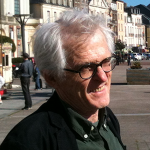2016 SIGCHI Awards
Social Impact Award
Jonathan Lazar

Dr. Jonathan Lazar is a Professor of Computer and Information Sciences, and has served as director of the Undergraduate Program in Information Systems at Towson University since 2003. Dr. Lazar also founded the Universal Usability Laboratory at Towson University and served as director from 2003-2014. Within the area of human-computer interaction, Dr. Lazar is involved in teaching and research on Web accessibility for people with disabilities, user-centered design methods, assistive technology, and public policy. He has authored or edited 10 books, including “Ensuring Digital Accessibility Through Process and Policy” (2015, co-authored with Dan Goldstein and Anne Taylor, Morgan Kaufmann Publishers), “Research Methods in Human-Computer Interaction” (2010, co-authored with Heidi Feng and Harry Hochheser, John Wiley and Sons), “Universal Usability: Designing Computer Interfaces for Diverse User Populations” (2007, John Wiley and Sons), and “Web Usability: A User-Centered Design Approach” (2006, Addison-Wesley). His newest book, co-edited with Michael Stein of Harvard Law School, is titled “Global Inclusion: Disability, Human Rights, and Information Technology” and will be published by the University of Pennsylvania Press in mid-2016.
Dr. Lazar has published over 140 refereed articles in journals, conference proceedings, and edited books, and has been granted 2 US patents for his work on accessible web-based security features for blind users. He frequently serves as an advisor to government agencies, regularly provides testimony at the federal and state level, and multiple US Federal regulations cite his research publications. Dr. Lazar frequently partners with disability advocacy groups in his research, including the National Federation of the Blind and the National Down Syndrome Congress, and often presents outside of the HCI community, including educational and legal venues (e.g. EDUCAUSE, AHEAD, the Coalition for Networked Information, Korean Disability Law Association, Jacobus tenBroek Disability Law Symposium, Cherry Blossoms Conference on Federal Intellectual Property Policy). Dr. Lazar currently serves on the executive board of the Friends of the Maryland Library for the Blind and Physically Handicapped, and the State of Maryland Work Group on Increasing the Teaching of IT Accessibility Concepts in State Universities. He has served multiple roles in SIGCHI, including, most recently, adjunct chair of Public Policy (2010-2015) and Digital Accessibility Chair (CHI 2014).
Dr. Lazar has been honored with the 2015 AccessComputing Capacity Building Award (sponsored by the University of Washington and NSF), for advocacy on behalf of people with disabilities in computing fields, the 2011 University System of Maryland Regents Award for Public Service, and the 2010 Dr. Jacob Bolotin Award from the National Federation of the Blind. During the 2012-2013 academic year, Dr. Lazar was selected as the Shutzer Fellow at the Radcliffe Institute for Advanced Study at Harvard University, to investigate the relationship between human-computer interaction for people with disabilities, and US Disability Rights Law.
Lifetime Service Award
Gary M. Olson

Gary M. Olson is Donald Bren Professor of Information and Computer Sciences at the University of California, Irvine, where he has been since 2008. Prior to that he was the Paul M. Fitts Professor of Human-Computer Interaction at the University of Michigan. He received his PhD in cognitive psychology in 1970 from Stanford University. He served for three years in the U.S. Navy after that, doing human factors research at the Navy Submarine Medical Research Center in Groton, Connecticut. He was briefly on the faculty of Michigan State University prior to moving to the University of Michigan in 1975.
In the early 1980s he first became interested in human-computer interaction, and in 1983, he, along with colleagues Judy Olson, Paul Green, and Marilyn Mantei, taught the first graduate course in HCI at Michigan. From the mid-80s on, he, along with Judy, has studied how information technology can play a role in collaboration. Increasingly this work focused on collaboration at a distance, and led to their highly cited paper in 2000 in Human-Computer Interaction, “Distance Matters.” Later they published an edited book on Scientific Collaboration on the Internet (MIT Press, 2008), and more recently, Working Together Apart (Morgan & Claypool, 2014). This work has been supported by the National Science Foundation, the Army Research Institute, Apple, Ameritech, US West, Anderson Consulting, Intel, the John D. Evans Foundation, and most recently, Google.
He has long been active in SIGCHI. He co-chaired the first two DIS conferences, the CSCW conference in 2004, and chaired the CHI conference in 2006. He chaired or co-chaired numerous conference functions, mostly at CHI or CSCW. He chaired the SIGCHI Awards committee 2007-2010, the CSCW Steering Committee 2008-2012, and served as Vice-President for Finance on the SIGCHI Executive Committee 2009-2015.
He is an ACM Fellow, as well as a Fellow of the American Psychological Association and the Association for Psychological Science. He was elected to the CHI Academy in 2003, and along with Judy Olson, received the SIGCHI Lifetime Achievement Award in 2006.
Gerrit C. van der Veer

Gerrit van der Veer has been a researcher and teacher in Universities since the early sixties. He developed and taught courses on interactive systems design in universities in Romania, Spain, Germany, The Netherlands, Italy, Belgium, and China. He is Emeritus Professor at the Vrije Universiteit in Amsterdam, the Netherlands, department Multimedia and Culture. Currently he is supervising PhD students at the Dutch Open University (department Human-Computer and Society) and at the University of Twente (department Human-Media Interaction), both in the Netherlands, while at the Dalian Maritime University, China, he developed and teaches MSc courses on Usability Engineering, on Research Methods for HCI, on Design for Cultural Heritage, and on Service Design.
His MSc in Cognitive Psychology was on mathematical learning models as tools for adaptive computer supported learning (1965), his PhD (awarded, both, by the department of Cognitive Psychology and the department of Computer Science at the Vrije Universiteit Amsterdam) was on Individual differences, mental models, and designing the user interface. He was Head of the department of Cognitive Ergonomics of the University of Twente, and then was appointed Professor at the department of Computer Science in Amsterdam. After reaching the age of retirement he was appointed Professor of Computer Science at the Dutch Open University and Professor of design at the faculty of Architecture at the University of Sassari, Italy. He published over 200 papers at conferences and in journals, and edited over 10 volumes of research in HCI related domains.
His research programs include mental models of interactive systems, task analysis, design for individual differences, user interface architecture, experience design, and ICT for cultural heritage, and, recently, design of electronic learning environments for adult learning. With his partner Elly Lammers and with Thomas Green he developed in 1982 the European Association of Cognitive Ergonomics with the annual ECCE conference. In 1989 he joined IFIP TC 13 as well as SIGCHI and became a volunteer aiming at making both organizations more globally active. He was co-chair of the first CHI ever outside North America and at the same time the largest IFIP INTERACT ever (Amsterdam 1993). He took many volunteer roles in SIGCHI, including Vice President for Conferences, Chair for CHI 2005 (Portland), and President (2009-2015).
He is awarded the IFIP TC13 Pioneer award, he is Honorary Member of Chi Nederland, who made me Godfather of the annual award for best Master thesis on Human Computer Interaction in the Netherlands, and awarded by the former Dutch Queen (like his wife Elly Lammers) the title of Knight of the Order of Oranje-Nassau for long term services to society.
Lifetime Achievement in Research
Robert E. Kraut

Bob Kraut is the Herbert A. Simon Professor of Human-Computer Interaction in the School of Computer Science and Tepper School of Business at Carnegie Mellon University and one of the founding members of CMU’s Human-Computer Interaction Institute. Previously he was a professor at the University of Pennsylvania and Cornell University and a research scientist at Bell Laboratories and Bell Communications Research.
Bob is a social psychologist with broad interests in the impact of computing and telecommunications on individuals, groups and organizations and ways to design them to improve human lives. He has conducted empirical research on online communities, the social impact of the Internet, the design of information technology for small-group intellectual work and related topics. Starting with his HomeNet project, he has spent over 15 years conducting research to understand how the way people use technology influences their psychological well-being and personal relationships. His research on online communities combines careful empirical studies of communities with interventions and design ideas to improve them. This approach is illustrated in his book with Paul Resnick, Building Successful Online Communities: Evidence-Based Social Design. His most recent research focuses on ways to improve productivity and creativity in online production.
Lifetime Achievement in Practice
Jeff A. Johnson

Jeff Johnson is President and Principal Consultant at UI Wizards, Inc., a product usability consulting firm that offers UI design, usability reviews, usability testing, and training (http://www.uiwizards.com). He also is a principal at Wiser Usability, a consultancy focused on elder usability and universal accessibility (http://WiserUsability.com). He has worked in Human-Computer Interaction since 1978. After earning B.A. and Ph.D. degrees from Yale and Stanford Universities, he worked as a user-interface designer and implementer, engineer manager, usability tester, and researcher at Cromemco, Xerox, US West, Hewlett-Packard Labs, and Sun Microsystems. In 1990, he co-chaired the first Participatory Design conference, PDC’90. Since 2004 he has served on the SIGCHI U.S. Public Policy Committee. He has taught at Stanford University and Mills College, and in 2006 and 2013 taught HCI as a Visiting Erskine Fellow at the University of Canterbury in Christchurch New Zealand. He has been an ACM Distinguished Speaker, and in 2014 was inducted into the ACM SIGCHI Academy. He has authored or co-authored many articles and book chapters on a variety of topics in Human-Computer Interaction and the impact of technology on society, as well as the books GUI Bloopers (2000), Web Bloopers (2003), GUI Bloopers 2.0 (2007), Designing with the Mind in Mind (2010), Conceptual Models: Core to Good Design (2011; coauthored with Austin Henderson), and Designing with the Mind in Mind, 2nd Edition (2014). His forthcoming book, co-authored with Kate Finn, is on designing for an aging population.
SIGCHI Academy
Margaret Burnett

Margaret Burnett is a Professor of Computer Science at Oregon State University. She began her career in industry, where she was the first woman software developer ever hired at Procter & Gamble Ivorydale. A few degrees and start-ups later, she joined academia, with a research focus on people who are engaged in some form of software development. She was the principal architect of the Forms/3 spreadsheet language, and pioneered the use of information foraging theory in the domain of software debugging. As founding Project Director of the EUSES Consortium, she and her collaborators re-imagined the area of end-user programming to co-found the area of end-user software engineering. She and her team also performed seminal work that systematically investigates “gender-neutral” software, uncovering pervasive gender bias in software from spreadsheets to programming environments. She has published more than 200 papers, with several receiving best paper awards and honorable mentions, and has presented invited talks and keynotes over her research in 14 countries. Burnett is also an award-winning mentor, particularly to women and underrepresented groups.
Elizabeth F. Churchill

Elizabeth Churchill is a Director of User Experience at Google focusing on the design and development of devices and developer tools for the connected ecosystems of the Social Web and Internet of Things. Her undergraduate degree was in Experimental Psychology and her Masters in Knowledge Based Systems both from the University of Sussex, and her Phd from Cambridge in Cognitive Science.
While working as a postdoctoral research scientist at the University of Nottingham, Elizabeth was invited to join the emerging industry research lab FXPAL, Fuji Xerox’s research lab in Silicon Valley, as a Senior Research Scientist. Since then, Elizabeth has been a principal contributor and leader for research at well known corporate research and development organizations including the Xerox affiliated Palo Alto Research Center (PARC), eBay Research Labs in San Jose and Yahoo! in Santa Clara, California.
Elizabeth has contributed groundbreaking research in a number of areas, publishing over 100 articles in the fields of theoretical and applied psychology, cognitive science, human-computer interaction, mobile and ubiquitous computing, computer mediated communication and social media. Elizabeth has also co-designed and managed the launch of successful products, has more than 50 patents granted or pending, and has co-edited books on conversational agents, virtual environments, public and situated displays, and agent supported cooperative work. She was a co-author of the recent academic text, Foundations for Designing User Centered Systems, and has an upcoming book entitled Designing with Data, to be published by O’Reilly in 2016. She has been a regular columnist for ACM’s interactions magazine.
An ACM Distinguished Scientist and Speaker, Elizabeth has been very active in SIGCHI for two decades. She has held many leadership roles in conferences, and served on the SIGCHI Executive Committee for 8 years, 6 years of those as Executive Vice President. Elizabeth also currently serves on the advisory boards for the University of California at Berkeley’s School of Information and the Mobile Life Centre in Kista, Sweden, is a visiting scholar with Stanford University’s Media X, and is a visiting professor at the University of Newcastle Upon Tyne in the School of Computing Science.
Allison Druin

Allison Druin is Special Advisor for National Digital Strategy for the National Park Service, on leave for 2-years from the University of Maryland. Prior to her government work, she was Chief Futurist for the University of Maryland’s Division of Research, a Professor in the iSchool, and a researcher in the Human-Computer Interaction Lab. In her own personal research, for almost 20 years, she has led design teams of children and teens, computer scientists, educators and more to develop new educational technologies for young people with co-design methods. Her research focus has been to develop new co-design methods that give voice to children in the technology development process. Over the years, her team has created a variety of new technologies which have included new mobile storytelling devices, digital libraries to support cultural tolerance, and robotic toys for active learning. She has been honored by SIGCHI for her work by receiving the 2010 SIGCHI Social Impact Award. She has been quite active as a CHI conference volunteer for over 20 years and she is currently conference co-chair for CHI2016. She holds a Ph.D. from the University of New Mexico in K-12 technologies, a M.S. from the MIT Media Lab, and a B.F.A in graphic design from the Rhode Island School of Design.
Susan R. Fussell

Susan R. Fussell is a Professor in the Department of Communication and the Department of Information Science at Cornell University. She received her BS degree in psychology and sociology from Tufts University, and her Ph.D. in social and cognitive psychology from Columbia University. Prior to joining Cornell University in 2008, she was an Associate Research Professor in the Human-Computer Interaction Institute at Carnegie Mellon University. From 2010 to 2012, she served as a Program Officer in the Human-Centered Computing cluster in the Division of Information and Intelligent Systems (CISE/IIS) at the National Science Foundation. Susan’s primary interests lie in the areas of computer-supported cooperative work and computer-mediated communication. Her earlier work focused on how gesture, gaze and other communication channels help people coordinate their efforts on physical tasks. Her current projects examine the effects of culture and native language on computer-mediated communication, collaboration among intelligence analysts, tools to motivate people to reduce their energy usage, human-robot interaction, and telepresence robotics.
Yves Guiard

Yves Guiard, an experimental psychologist specializing in the study of human movement, earned his PhD in cognitive neuroscience from the University of Marseilles, France. He spent two year-long sabbaticals in Britain, one in Oxford (1984-85) and the other in Cambridge, UK, where he was elected a French Government Fellow of Churchill College (1996-97). Now an Emeritus Research Director at the CNRS, he works in Paris in the VIA team of the LTCI, a joint research laboratory between the CNRS and Telecom-ParisTech. The kinematic chain model Yves proposed in 1987 was found useful by HCI researchers a decade later when they began exploring the intriguing possibility of two-handed interaction. His other research interests include stimulus-response compatibility and the speed/accuracy trade-off of aimed movement, currently his main focus. With colleagues and PhD students, he has introduced a number of tricks for facilitating target acquisition in GUIs and has designed and tested many novel interaction techniques, especially for mobile devices. He has extended Fitts’ law to the challenges of pointing in multiscale electronic worlds and pleaded for perspective visualization of everyday documents. Yves has sat on several program committees for CHI and is currently an associate editor of ACM TOCHI.
Leysia Palen

Leysia Palen is Professor and Founding Chair of the newly established Department of Information Science at the University of Colorado Boulder (USA), where is also Professor of Computer Science. She is a faculty fellow with the ATLAS Institute and the Institute of Cognitive Science at Colorado. She is also a Full Adjunct Professor at the University of Agder in Norway.
Prof. Palen is the author of over 70 articles and a co-edited book in the areas of human computer interaction and computer supported cooperative work, with an emphasis on crisis informatics, an area she forged with her graduate students and colleagues at Colorado. For this work, Prof. Palen was awarded the 2015 ACM Computer Human Interaction Social Impact Award. Her research has been supported by the US National Science Foundation, including an NSF CAREER award She is an Associate Editor for the Human Computer Interaction Journal (Taylor and Francis) and for the Computer-Supported Cooperative Work Journal (Springer).
Prof. Palen is a graduate of the University of California, San Diego with a BS in Cognitive Science, and of the University of California, Irvine with an MS and PhD in Information and Computer Science. As an undergraduate, she spent time at the University of Stirling, Scotland, and as faculty member at the University of Aarhus, Denmark and the University of Agder, Norway. She has worked at Boeing Commercial, USWEST Advanced Technologies, Microsoft Commercial and Xerox PARC.
Daniel M. Russell

Daniel M. Russell is a senior research scientist at Google where he works in the area of search quality, with a focus on understanding what makes Google users happy in their use of web search.
As an individual contributor, Dan is best known for his studies of sensemaking behavior of people dealing with understanding large amounts of information. He is also known for work on the large, interactive IBM BlueBoard system for simple shoulder-to-shoulder collaboration, and his contributions to online education in the form of the Massive Open Online Course (MOOC) called “PowerSearchingWithGoogle.com” which has taught search skills to over 700K students.
Before joining Google, he also held research positions at IBM’s Research Almaden Research Center (San Jose, CA), Apple’s Advanced Technology Group (ATG), and Xerox PARC. Dan has also been an adjunct lecturer in computer science at University of Santa Clara and at Stanford University, and is currently an adjunct faculty member at the University of Maryland, College Park. He teaches internationally, helping students, teachers, investigative reporters, librarians, and even the occasional rocket scientist to be more effective in their online research skills.
Dr. Russell received his B.S. in Information and Computer Science from U.C. Irvine, and his M.S. and Ph.D. degrees in Computer Science from the University of Rochester (1983). While at Rochester, he did research work in the neuropsychology of laterality, models of apraxia and aphasia, coordinated motor movements and computer vision.
Dan enjoys long-distance running, music and wordplay, becoming disgruntled when all three don’t happen in a single day.
John Stasko

John Stasko is a Professor in the School of Interactive Computing at the Georgia Institute of Technology, and an Honorary Professor in the School of Computer Science at the University of St. Andrews in Scotland. With his students and colleagues, John has published over 170 papers on human-computer interaction and related subareas such as software visualization, computer science education, peripheral and ambient displays, information visualization, and visual analytics. Most recently, his research has focused on developing ways to help people and organizations explore, analyze, and make sense of large amounts of data, primarily through the use of visualization. John received the IEEE VGTC Visualization Technical Achievement Award in 2012, in part for his work on the Jigsaw visual analytics system. He has been on the editorial boards of multiple journals including ACM ToCHI, IEEE TVCG, and Information Visualization. He also has been Papers Co-Chair of the IEEE InfoVis and VAST Conferences, and General Chair of the IEEE VIS meeting in 2013.
